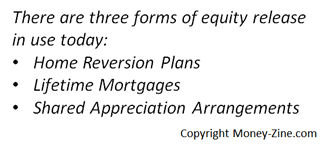Individuals interested in putting their home to work can choose from one of several equity release strategies, which allows homeowners to use the money invested in their home to provide a steady source of income. In this article, we're going to explain how homeowners can use an equity release strategy to create a future income stream. As part of that explanation, we're going to review several types of programs offered today. We'll also talk about the pros and cons of using this approach.
Equity Release
Additional Resources |
While the term "equity release" is used in this article to describe the return of a home's value back to its owner, the concept can be applied to any marketable asset. An equity release approach is similar to a reverse mortgage, although the cost of this arrangement is usually less. Unlike a home equity loan, the borrower isn't obligated to repay a portion of the outstanding principal each month.
Release Products
While the number of equity release products is only limited by the imagination of marketers; in general, there are three different products in use today:
Home Reversion Plans
Lifetime Mortgages
Shared Appreciation Arrangements
With all of these programs, the participant continues to live in the home until it's sold, which is one of the important advantages of these products.
Home Reversion Plans
A home reversion plan allows the homeowner to extract the exact amount of the home's value necessary to satisfy a need for income. The homeowner, as well as their partner, is permitted to stay in the house until it is sold. The amount paid in this plan is a function of the home's value, as well as the age of the participants.

When the home is eventually sold, a percentage of the sale's proceeds are paid back to the reversion company. This feature makes this type of plan inappropriate for individuals that want to leave the entire property to their heirs as part of an inheritance estate.
Lifetime Mortgages
A Lifetime Mortgage plan allows the borrower to take out a loan that is secured by the home. With a lifetime mortgage, the loan itself, as well as the interest charges, are paid back when the home is sold; usually at the time of the homeowners' death, or when they move to a long-term care facility. Since the principal and interest on the loan are not paid back, the accrued interest is added to the loan, and its size grows over time. When the home is eventually sold, the proceeds from the sale are used to pay off the loan's outstanding balance.
Shared Appreciation Arrangements
This final equity release product is called a shared appreciation arrangement. This plan allows the borrower to sell a percentage of the home to a lender. In doing so, the borrower agrees to give up a share of the home's appreciation in value. In exchange, the homeowner receives a lump sum payment from the lender. For example, the lender might be willing to pay the homeowner 10% to 15% of the home's value in exchange for half (50%) of the appreciation in its value over time. If two people live in the home, the payment may be as high as 20% to 30% of the property's value; however, the entire appreciation (100%) in the home's value would be paid to the lender when it's sold.
Pros and Cons of Equity Release
These programs appear to offer retired individuals an ideal way of accessing the money they have invested in their homes. That's an excellent way of allowing some financially-strapped individuals to enjoy their retirement years. But as we'll soon explain, there are some disadvantages associated with these programs too.
Advantages
Access to Money: the single biggest asset many retirees own is their home. Equity release allows these individuals to extract the money invested in their homes; thereby providing a source of income to the household.
Ownership Rights: although these programs essentially split the ownership of the home with the lender, there is no need for anyone to move out. There also isn't any reason to downsize a home to extract equity, which is a common approach taken by many retirees.
Costs: the upfront costs associated with these programs are typically lower than alternatives such as obtaining a home equity loan or refinancing a mortgage.
Repayment: there is no need to repay the money received from these programs back to creditors each month; the money owed is paid when the home is eventually sold.
Disadvantages
Inheritance: equity release programs usually require the home to be sold when the applicant passes away, or when the owner moves to another community. This means the home cannot be inherited by a family member.
Reduction in Inheritance: these programs are a loan of money, and when the home is sold, the lender must be repaid. This means there is less money to be inherited, or donated to charitable organizations when the owner passes away.
Future Price Appreciation: since ownership of the home is split with the lender, they're entitled to a share of the home's appreciation in value over time. This may be a very good deal for the lender if the transaction involves a depressed housing market that is on the rise.
This last point is an important one to understand. When an economic recession hits the stock market, home prices usually decline too. Retirees looking for alternative sources of income during these recessions might consider equity release to help close a financial gap. When home prices eventually rebound (as they historically do), the benefit of this rise in home value is shared with the lender.
About the Author - Home Equity Release Strategies

.jpg)

